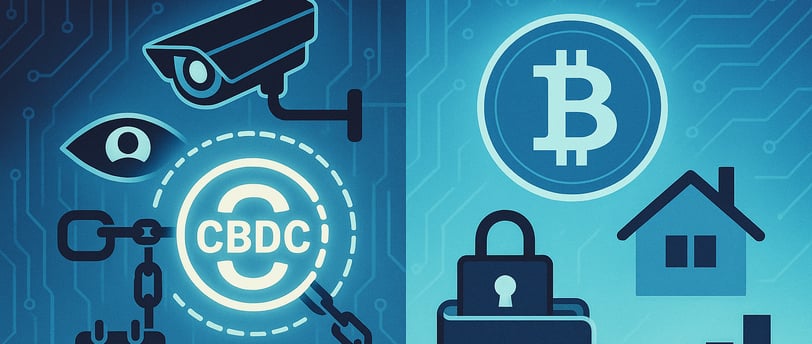Protect Your Wealth and Privacy: The Truth About Central Bank Digital Currencies (CBDCs)
Central Bank Digital Currencies (CBDCs) are gaining momentum globally, but they come with risks to personal freedom and financial privacy. From programmable money to government control, CBDCs could reshape how we use and track money. Some countries are banning them, while others push forward. Learn what CBDCs mean, the threats they pose, and smart ways to protect your wealth and privacy—including investing in Bitcoin, real estate, and stocks.
BITCOINALTERNATIVE ASSETCBDC
6/3/20253 min read


As the world moves toward digital currencies, Central Bank Digital Currencies (CBDCs) have entered the spotlight as government-backed digital money alternatives. While these initiatives promise efficiency and innovation, they also raise serious concerns about personal freedom, privacy, and economic control.
What Are Central Bank Digital Currencies (CBDCs)?
CBDCs are digital versions of a country's fiat currency issued and controlled by the central bank. Unlike cryptocurrencies like Bitcoin, they are centralized and fully regulated. Governments see CBDCs as a way to modernize payments, reduce costs, and improve financial inclusion.
However, the very control that makes CBDCs appealing to governments can threaten individual freedom. Since CBDCs operate on a digital platform managed by authorities, every transaction could be tracked and controlled.
Threats to Freedom and Privacy
Unlike cash, which is anonymous and untraceable, CBDCs can provide central banks with unprecedented oversight of financial activity. This level of surveillance poses a significant privacy threat:
Tracking & Monitoring: Authorities could monitor every transaction in real time, eroding financial privacy.
Programmable Money: CBDCs can be designed with specific rules, such as money expiring after a set time or being restricted to certain types of purchases. This raises concerns of government overreach and loss of financial autonomy.
Control & Censorship: Central banks could freeze or block transactions, limiting the ability to freely use one’s money.
Economic Experimentation through CBDCs
CBDCs open new doors for economic experiments, some of which sound like science fiction:
"Time-Limited" Money: Digital cash could be programmed to lose value after a certain period, encouraging faster spending or discouraging hoarding.
Conditional Spending: Funds might be designated for specific uses, such as welfare payments that must be spent on essentials, restricting personal choice.
Negative Interest Rates: Easy implementation of negative interest rates could discourage saving and alter traditional financial behaviors.
Such experiments, while innovative, could profoundly impact personal freedom and economic stability.
Countries Banning or Embracing CBDCs
The global response to CBDCs is mixed:
USA: Some aspects of CBDCs face pushback and legislative hurdles. Efforts to fully launch a CBDC have been met with caution over privacy and freedom concerns, with some proposals being effectively stalled or banned in practical terms.
Brazil: Actively progressing with CBDC development—the Central Bank of Brazil (Banco Central do Brasil) is leading projects to launch the "Digital Real," signaling readiness to adopt and integrate CBDCs for everyday use.
Other Countries: China is a prominent example aggressively pushing its digital yuan, already in trial phases, raising international debates on privacy and control.
This uneven adoption landscape means some populations will face CBDCs' risks sooner than others.
How Investors Can Protect Themselves
If you are concerned about losing control over your money and privacy due to CBDCs, here are strategies to safeguard your wealth and freedom:
Invest in Bitcoin with Self-Custody: Bitcoin offers a decentralized, censorship-resistant alternative to CBDCs. By holding Bitcoin in self-custody wallets, investors maintain full control and privacy over their assets.
Invest in Real Assets (Real Estate): Real estate remains a tangible, non-digital asset immune to direct digital surveillance, providing both wealth preservation and inflation hedging.
Invest in Stocks: Equities represent ownership in companies and are less directly affected by CBDC controls, providing potential growth and diversification outside government-controlled digital cash.
Balancing traditional and modern investments can help investors maintain financial autonomy and privacy.
Conclusion
Central Bank Digital Currencies are poised to reshape global finance but carry risks that extend beyond convenience and technology. They potentially threaten freedom and privacy through government surveillance and digital control over money. While some countries ban or delay CBDCs, others push forward with ambitious plans, making it crucial to stay informed and prepared.
Wise investors protect themselves by diversifying into Bitcoin with self-custody, real assets like real estate, and stocks. Understanding the implications of CBDCs helps you safeguard your wealth and personal freedom in a rapidly changing financial world.
Further Reading
Stay updated with finance news and trends.
Contact
info@bullsandbearsblog.com
© 2025. All rights reserved.


